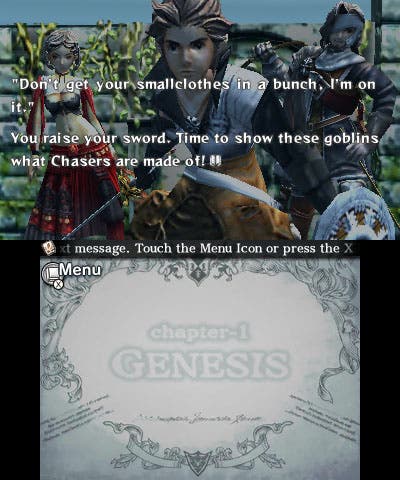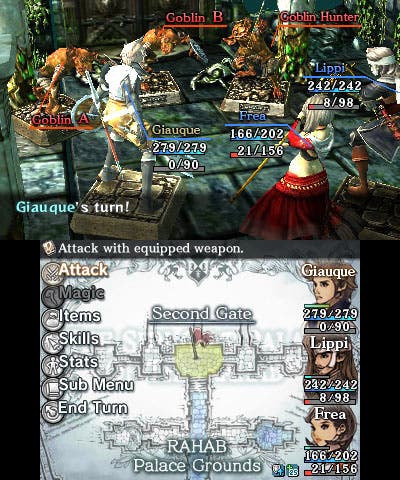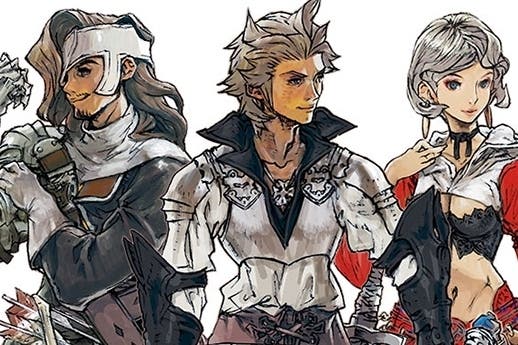Crimson Shroud review
Rock and roll.
Amidst the bluster, high drama and expensive spectacle of many a Japanese role-playing game it's easy to forget about the dice rolls that power them - that little cascade of chance that dictates every sword thrust and every spell cast. Crimson Shroud, the third and likely final part of Level 5's Guild01 anthology (split into a series of releases on Nintendo's eShop in the West), is an explicit remembrance of all that. Here is an RPG that's more in thrall to Dungeons & Dragons than it is to Final Fantasy, and one that exposes every roll of the dice. It's a tribute to the genre's roots, and a largely triumphant return to a slower, more considered style of play.

Crimson Shroud draws a strong, thick line between console RPGs and table-top gaming, and it's this knowing, self-reflexive veneer that lends it so much charm. You're in charge of a trio of customary characters: there's Giaque the noble leader, flanked by mysterious mage Frea and cocky archer Lippi. Their tale isn't told through lavish animations and overbearing voice-overs, though - it's played out by inanimate die-cast models and passage upon passage of dense text.
Combat's turn-based and traditional, though it's punctuated by dice rolls carried out on the 3DS's lower screen, deciding the success of a status effect or tallying up how many health points your spell will recover. There's a nicely overstated element of craft here, and it helps make fighting about more than just negotiating menus, as well as allowing for some imaginative flourishes: kill an enemy model and it's upended, revealing a small Level 5 imprint on the underside of its base.
The heavy, detailed narration draws another line from the handheld to the tabletop, placing a fresh emphasis on the role of the Dungeon Master. It's a key position in any game of Dungeons & Dragons, a part that asks for a wealth of imagination and a strong grasp of the rules. Good thing for Crimson Shroud, then, that its own Master is the legendary director Yatsumi Matsuno. It's his presence that elevates the game from a throwaway curio to something much more intriguing.
Matsuno's games are renowned and revered for their rich, detailed worlds and for their equally deep lattice of systems. Crimson Shroud is no different, and it's a welcome return for one of the most exquisite talents in gaming: this is arguably his first all-new game since he left work on Final Fantasy 12 a year before its completion, and his first truly original effort since 2001's Vagrant Story.
Indeed, it's Vagrant Story that this most often resembles. There's a shift away from traditional levelling and an emphasis on crafting, with stats being tied firmly to the items picked up upon defeating enemies and through plundering chests. Items can in turn be melded together, creating new weapons and armour with enriched power and attributes. It's a system that's heavy on player experimentation, but short on explanation and hand-holding.

In look and feel, Crimson Shroud is unmistakably a Matsuno game too, recalling what made the likes of Final Fantasy Tactics, Tactics Ogre and elements of Final Fantasy 12 so magical. There's an opulence to the telling of an otherwise rote story that makes this more than mere fantasy and that casts the everyday RPG elements in a soft, evocative light.
The caverns of Crimson Shroud are darker and damper than those of other RPGs; the crumbling churchyards and passageways are bathed in a bleached sun that's more blinding. Our hero's tale may be played out in a succession of dungeons populated by skeletons, goblins and minotaurs, but there's a lightness of touch that whisks you back to the warm whimsy of Ivalice.
It helps, for sure, that Matsuno is flanked by several long-standing accomplices. Hitoshi Sakimoto provides a typically emotive score, while Alexander O Smith serves up a translation that's just as ornate, the two working together to create a world in possession of a tender melancholy.
As a return, then, this is a success, though it's not without flaws. Like its companions in the Guild01 anthology, there's an air of experimentation that excites but also leads to some rough edges. Crimson Shroud has a nasty habit of being a little too obtuse, while some of the long, ponderous battles towards its end tend towards plain nasty. This is a short game, especially by Matsuno's standards, but its playtime is padded out uncomfortably by long stretches of mindless, frustrating backtracking.
Such problems aren't enough to mar a game that, for lovers of RPGs, is close to essential. It's much more than a reminder of where they came from; it's a welcome - and long overdue - reminder of one of the genre's strongest voices.

